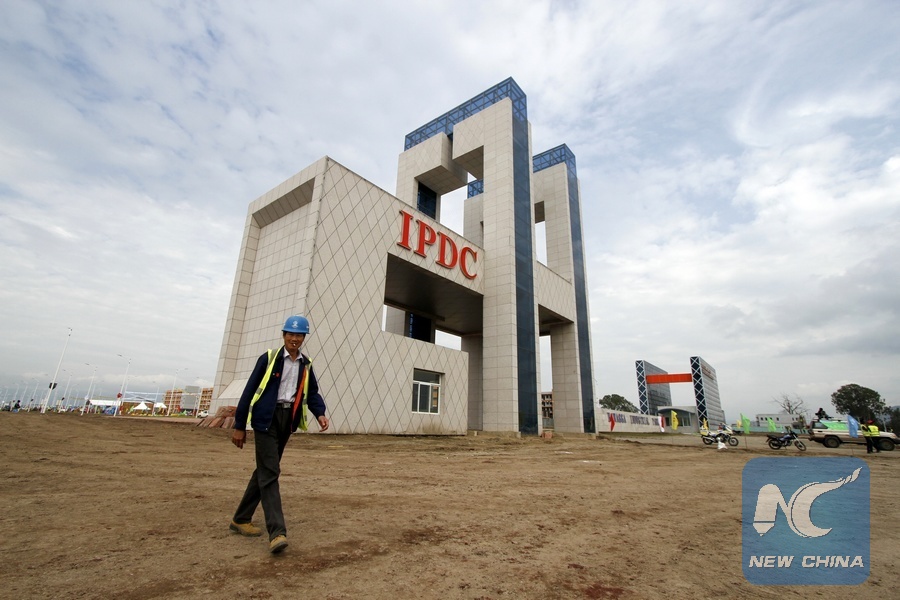
A worker walks at the Hawassa Industrial Park in Hawassa town, 275 kilometres south of Addis Ababa, capital of Ethiopia, July 13, 2016. TO GO with Xinhua Headlines: Chinese support propelling Africa's solid progress toward industrialization. (Xinhua/Michael Tewelde)
ADDIS ABABA, Jan. 18 (Xinhua) -- As African countries are seeking clean energy to drive their economic development, China has stressed its commitment in fostering cooperation with Africa in this area to promote their comprehensive strategic cooperative partnership.
Observers said energy development is key to sustainable development of Africa. China has been fulfilling its promises made at summits held in Johannesburg and Beijing in facilitating efforts to meet Africa's power demand with clean and green alternatives.
ECO-FRIENDLY INVESTMENT
Chinese engagement in Africa's clean energy-driven industrialization is vivid in industrial parks on the continent.
In Ethiopia, the East African country dubbed its flagship Hawassa Industrial Park as a model for economic and environmental sustainability. The park, designed and constructed by Chinese companies, applies the latest technology to treating and recycling about 90 percent of its water usage.
Former Ethiopian Prime Minister Hailemariam Desalegn said the park can be seen as a "foundation in Ethiopia's ambition to be the manufacturing hub of the African continent."
To realize its ambition by 2025, Ethiopia has stepped up cooperation with China in undertaking massive projects, including constructing a high voltage electric transmission line to 6,450 MW hydro dam currently under construction on Blue Nile river, the 51 MW Adama I and 153 MW Adama II wind farm projects and the 300 MW Tekeze hydro project.
Costantinos Bt. Costantinos who served as an economic advisor to the African Union and the United Nations Economic Commission for Africa told Xinhua that "Ethiopia had witnessed various renewable energy-driven projects with the support of China over the years that helped the country's development efforts."
"Electric energy production projects, clean-energy public services such as the electrified railway in Addis Ababa and all the way to the Djibouti port, and various power transmission lines are among the various Chinese-sponsored or Chinese-built projects in Ethiopia that served as a major drive to the country's ambitions," he said.
STRATEGY ALIGNMENT
In order to build a China-Africa community with a shared future, China and African countries have been implementing consensus made at the Johannesburg and Beijing summits of the Forum on China-Africa Cooperation (FOCAC) held in 2015 and 2018 to align their respective development strategies.
Costantinos, also a professor of public policy with the Addis Ababa University in Ethiopia, said that clean energy development is a priority for Ethiopia and fellow African countries as they envisage sustainable industrialization and development.
To help improve infrastructure and address power shortage in Africa, China has provided aid for the construction of more than 10,000 km of highways, more than 6,000 km of railways, and hundreds of airports, ports and power stations.
In Uganda, engineers are busy testing the Isimba Hydropower Plant before the official commissioning slated for late January.

Photo taken on Aug. 8, 2017 shows the construction site of Isimba Power Plant Project in Kayunga district, Uganda. As River Nile, the longest in the world, snakes through central Uganda, Chinese engineers and their local counterparts are constructing a multi-million U.S. dollar power plant on its bank in the remote Kayunga district.(Xinhua/Zhang Gaiping)
The 183 MW power plant constructed by Chinese companies on Rive Nile, together with Karuma Hydropower Plant still under construction, will address the country's power shortage, which economic experts said was stalling economic development.
In North Africa, such cooperation has led to the creation of Morocco's Noor Solar Complex, the world's largest concentrated solar power project. After completion of all four phase of projects, the Noor station will provide clean energy for more than 1 million households and even export surplus electricity to Europe.
Chinese Ambassador to Ethiopia Tan Jian told Xinhua that "energy is needed for poverty alleviation and for economic development, as Ethiopia embarks on a massive industrialization drive with the assistance of China."
China has been encouraging its companies to invest in Ethiopia's energy sector in particular and Africa in general, with due emphasis given to the wind and hydro energy sub-sectors and assistance in improving electricity grids, Tan said.
At the FOCAC Beijing summit, China promised to jointly promote the Belt and Road Initiative with international partners, hoping to create new drivers to power common development and bring together different civilizations.
Proposed by China in 2013, the Belt and Road Initiative aims to build a trade and infrastructure network connecting Asia with Europe, Africa and beyond along the ancient trade routes of the Silk Road.
Earlier this month, Chinese State Councilor and Foreign Minister Wang Yi paid a visit to Africa, carrying on a 29-year tradition of making Africa the destination of a top Chinese diplomat's first new year overseas trip.
During his trip, Wang said China will support Africa in achieving economic autonomy and sustainable development.
China is dedicated to helping Africa in its development and bringing benefits to the African people, he added.
"Energy is a mainstay of economic development," Costantinos said.
"African countries should invest more and find more partners on the energy sector, in which the development of renewable energy is far more sustainable while at the same time affordable given the abundant resources found on the continent," said the scholar.

